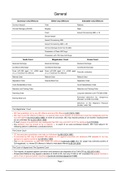Summary
Summary BPTC Criminal Revision Notes
- Course
- Institution
Revision notes condensing/summarising the syllabus of the 2019-20 BPTC course of Criminal Litigation. I created these notes over the course of the year and then updated during my revision period and I used only these notes and attained an Outstanding grade. The notes are structured in the form of ...
[Show more]



